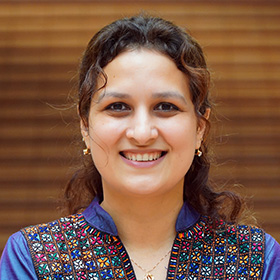This time, more students than usual attended the lecture of the Global Career Lecture Series, and extra chairs were needed quickly. The lecturer was Ms. Bazgha Syed, a research student at the National Graduate Institute for Policy Studies(GRIPS), and she delivered the entire lecture in English.

Ms. Syed had worked in the government of Pakistan, where she was born, as a civil servant of government for seven years. She now lives in Japan studying about international relations and national security. She talked about the issues that Pakistan faces, and her career in dealing with them.

At the beginning, Ms. Syed described what kind of country Pakistan was—its population, religions and history of wars and terrorism. Then, she spoke about the fact that indiscriminate acts of terrorism were widespread. For terrorists wanting to make a point or get publicity, they target not only governmental facilities and employees but also regular civilian ones like hospitals and elementary schools.

“When I saw an acquaintance whose family was lost to terrorism, I strongly realized that the problem of terrorism could come to me,” said Ms. Syed in a sad voice, filled with the unforgettable memory.

That sad experience became a starting point. She decided she wanted to work for the government of Pakistan, and passed its competitive exam.

Ms. Syed said, “It seems too hard to improve the actual conditions on the ground but, even so, I decided to try to change Pakistan. Until someone does, it will be never resolved.” Her feeling and the firm determination in her tone caught the audience’s attention quickly.

“Japan has a lot of things from which Pakistan can learn like governmental systems, legal agencies and the excellent education system. My goal is to improve Pakistan to make it secure like Japan after finishing my studies and returning to Pakistan.” The words of Ms. Syed, who has been engaged as a civil servant of the government of Pakistan for seven years, reminded the audience how lucky they were to live in a country as peaceful as Japan.

“What can Japanese people do to improve Pakistan’s?” asked a student, and Ms. Syed answered, “I’d like you to know what occurs in Pakistan first.”
Other students asked questions like: “I’ve heard news that Pakistan’s children cannot go to school. Is it true?” “Actually, how are the relationships with other countries that are said to be hostile to Pakistan?” The students had questions on a lot of topics which they hoped could help them understand Pakistan.

The students understood the importance of thinking about international issues as a member of the world in general. They sympathized with Ms. Syed who was working so sincerely to improve her homeland.




